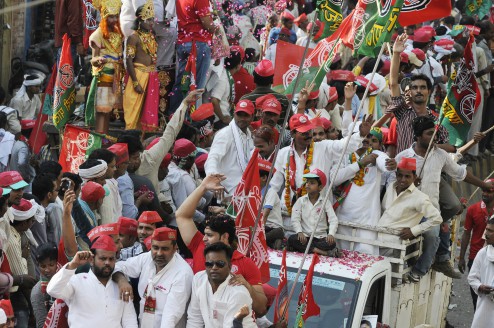
New Delhi: A company that has been in operation for less than three years will be able to donate money to a political party through electoral bonds, according to the terms finalised by the Centre on Tuesday.
But a party that could not secure 1 per cent of the vote in the previous election will not be eligible for the electoral bonds. This could pose a funding challenge for new political parties, especially the one that superstar Rajinikanth intends to float soon.
The Narendra Modi government hopes the electoral bonds will inject an element of transparency into election financing of political parties that have been dependent until now on dark pools of cash from unnamed sources.
The electoral bond will be an interest-free banking instrument, much like a promissory note, that every eligible political party will be able to encash through a designated bank account, finance minister Arun Jaitley told the Lok Sabha. "These bonds can be given only to a registered political party and only such parties, so that fake parties are not registered, which secured at least one per cent vote in the last election," Jaitley said.
The purchaser will be allowed to buy the electoral bonds only after he complies with the existing Know Your Customer (KYC) norms and makes payments from a bank account.
But it will not carry the name of the payee (the recipient of the donation). The corporate donor is under no obligation to disclose the name of the party to which the donation has been made.
Analysts have raised concerns. "Now a private corporation can make donations without starting commercial operations, let alone earning profits. There will be no obligation to publicly disclose the amount so donated and the identity of the recipient political party. Only the total sum of money so donated will be reflected in the profit and loss account of the company every year," an analyst said.
One analyst felt that the cloak of anonymity thrown over donors raises the prospect of perpetuating a system of crony capitalism that could boost the poll prospects of the party that happens to be in power when the donation is made.
When Congress leader Mallikarjun Kharge asked what purpose the bonds would serve when the name of the donor was not disclosed, Jaitley said the bonds would be reflected in the balance sheet of the donors. "Electoral bonds substantially cleanse the system," he said.
The Modi government had floated the idea of electoral bonds in the 2017-18 budget to make political funding more transparent. The bonds are designed to significantly reduce cash donations made to political parties.
The electoral bond can be purchased for any value in multiples of Rs 1,000, Rs 10,000, Rs 1 lakh, Rs 10 lakh and Rs 1 crore from the specified branches of the State Bank of India. The electoral bond will have a life of only 15 days during which it can be used for making donations only to the political parties.
Donors will be able to buy the bonds during a 10-day window that will open in the months of January, April, July and October. The Centre will specify an additional period of 30 days in the year when a general election is scheduled.
Political parties will be permitted to encash the bond only through a designated bank account with the authorised bank.
"The element of transparency is that the balance sheets of corporate donors will reflect these bond purchases. Political parties will file their returns with the Election Commission," Jaitley added.
"Cleaner money will now come into the hands of a political party," Jaitley said. "Earlier, there was no transparency under the cash-based system. No one had any idea about the source of the money and it was not known where it was spent."
In March this year, an amendment was made to the Companies Act, 2013, through a last-minute change in the Finance Bill 2017, which removed the cap that barred a company from donating more than 7.5 per cent of its average net profit in the three immediately preceding financial years to a political party.
The Finance Act, 2016, which amended the Foreign Contribution (Regulation) Act, 2010, allows political parties to accept donations from foreign companies.
Further, the Finance Act 2017 made amendments to the Income Tax Act that absolved all political parties from the duty of keeping records of donations received through electoral bonds. So, these donations will not be audited either.
Before the amendment to IT Act, under Section 13A of the IT Act, 1961, all political parties registered with the Election Commission were required to maintain details of donations of Rs 20,000 and above, received from any source, and have them audited. These were essential requirements for every political party to get exemption from paying income tax every year.
According to the NGO, Association of Democratic Reforms, 69 per cent of the income of political parties comes from unknown sources.










